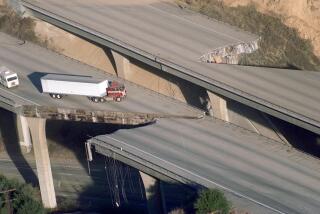Planning for the Big One
- Share via
It should be clear to everyone by now that preparations for the Big One should be made.
All families should have an earthquake plan and make sure every family member knows what to do if he is at home or away.
The plan, according to the American Red Cross, should include an evacuation plan and a way to relay messages to other family members through an out-of-state contact.
Some people, including many of those who have been directly affected by a major quake such as the 1971 Sylmar quake, have taken measures to protect themselves. They bear psychic scars, such as those suffered by war survivors.
Douglas Atterberry, Minu Chagolla, Kay Hynes and Rita Thayer--all people who were shaken to their own foundations by their experiences in Sylmar--say they are prepared.
Bruce Picken, Fred Auerbach and Cherry Uyeda--who were also involved in the Sylmar catastrophe--are not.
“Denial is probably a large part of it,” admits Picken, a psychiatrist who is now head of the medical staff at Olive View Hospital in Sylmar.
He was not in Sylmar when the earthquake struck and only later saw the devastation.
But he, and many others who might reasonably be expected to have been sobered by the experience, say they always mean to get it together, but just haven’t yet.
None deny the Big One will happen, but preparing for it is low on their list of priorities.
In some ways, lack of preparation is not seen as a totally bad thing, says psychiatrist Milton Greenblatt, who practices in Sylmar.
“I’m not saying people shouldn’t make preparations. That would be stupid. But denial is a mechanism that allows us to continue living in the face of grief--like the loss of a loved one--or fear,” he said.
People who do not have a strong sense of denial are unable to recover from the blows life presents, and they tend to develop phobias and extreme anxiety, according to the psychiatrist. Their functioning might actually be impaired.
Greenblatt said, however, that people who have experienced deep psychic scars--such as the disorientation of an earthquake--quite reasonably are more affected, and are therefore more willing to take the time and effort to protect themselves from a future quake.
The psychiatrist added that while it is healthy not to dwell on some disaster that might occur in the future, it is foolhardy not to make plans in case it does.
“Really intelligent people tend to take action when faced with possible adversity, even though they don’t dwell on it,” he said. “Action makes you feel better, gives you confidence and a sense that you have some control.”
More to Read
Sign up for Essential California
The most important California stories and recommendations in your inbox every morning.
You may occasionally receive promotional content from the Los Angeles Times.










